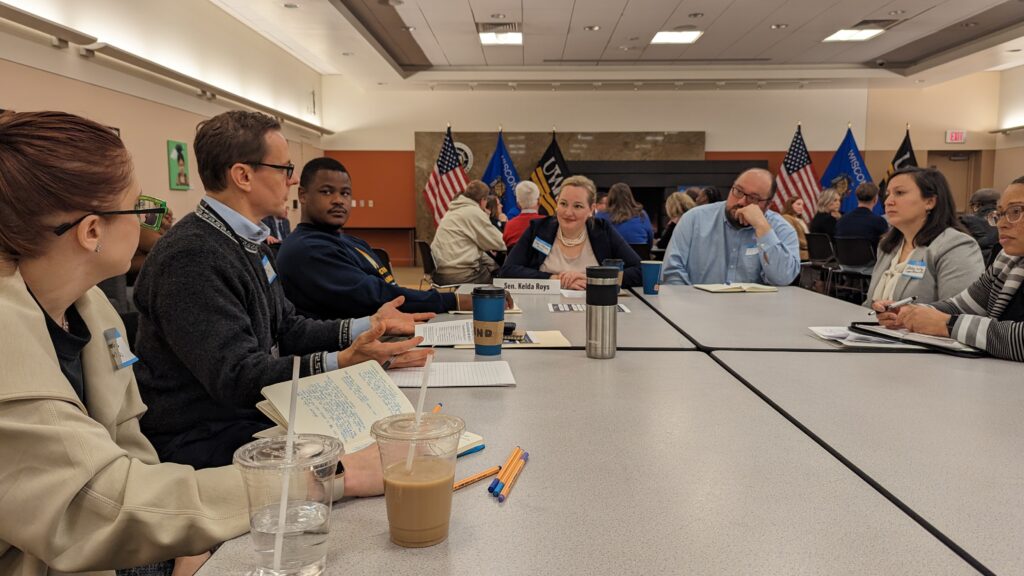Democrats Hold State Budget Listening Session in Milwaukee
Republican leaders scheduled sessions in four cities in state, but not Milwaukee, Madison.

Conversation between attendees at Sen. Kelda Roys’ table flowed from child care concerns to paid family leave to public education funding to shared revenue. Photo by Baylor Spears/Wisconsin Examiner.
Understaffed child care centers, Milwaukee’s looming financial crisis and needed investments in public education and the UW system are a few of the issues about 40 Wisconsinites brought to Democrats on the Joint Finance Committee (JFC) Monday morning.
Sens. LaTonya Johnson (D-Milwaukee) and Kelda Roys (D-Madison) and Reps. Evan Goyke (D-Milwaukee) and Tip McGuire (D-Kenosha) hosted a roundtable discussion at the University of Wisconsin-Milwaukee student union. The event followed last week’s announcement by Republican leaders that the JFC would host four budget listening sessions throughout April. Democrats were critical that none were planned in Milwaukee and Madison, the most populous areas of the state.
“It’s nice to have a budget listening session in Milwaukee,” one attendee commented before the event started.
Rilla Williams, a child care provider in Milwaukee, brought attention to underfunding of child care at the state level and the need for additional support in Milwaukee specifically, during a roundtable discussion with Johnson. She said investing in child care is necessary to support the workforce as a whole.
“We provide the service that most working parents need,” Williams said. “They need a safe place with high quality care for their children to go during the day and that is what we offer them.”
Proposals in Gov. Tony Evers’ budget plan, including $319 million to continue the state’s Child Care Counts program and $22 million that would continue a pandemic-funded grant program for employers purchasing child care on behalf of their employees, would boost support for child care.
The Child Care Counts program was started in 2021 using federal pandemic aid to help child care providers cover higher salaries for child care workers without raising tuition for parents. Evers wants to make that program permanent.
Williams said continuing the Child Care Counts program would help pay staff adequate wages and attract more people to the field.
“A number of people are leaving the field because we’re unable to provide them with a decent wage. They want just basic benefits, which we cannot offer, sick pay if they become ill, a retirement plan,” Williams said. “They just have no safety net.”
The way low wages contribute to Wisconsin’s labor shortage as well as the impending end of federal COVID-19 pandemic aid was a big concern for many, Goyke said.
“Specifically, we talked about respite care workers, in-home care workers, health care workers, child care and in the K-12 public education system — what happens when these one-time federal funds dry up and what will the state’s obligation be?” Goyke said.
Goyke said one constituent, who has a child with a disability enrolled in Medicaid, spoke about the wage cut their home health care worker took due to the child turning 18 and the reimbursement rate changing.
“The health care worker went from about $14 an hour when the child was a child to about $9 an hour when they’re an adult,” Goyke said. “The needs of the child didn’t change upon the child’s birthday, but because the child fell into one category versus the other the funding changed. That just really struck me as something we need to address.”
Mia Heredia and Kay Popian, the president and vice president of UW-Milwaukee’s student association, said they planned to speak with lawmakers about increasing accessibility for people with disabilities on campus and investing more heavily in the school’s accessibility resource center.
Heredia said with around 80% of students back in person, more people are returning comfortable in advocating for themselves and getting help with issues related to their disabilities or different limitations. She said this presents the right opportunity to double down on advocacy by student government for these students.
Popian said creating accessible infrastructure on the Milwaukee campus and on other UW campuses would include things like having more entrance ramps for buildings, accessible bathrooms and accessibility buttons.
“We’re seeing a deficit within our state, specifically in the UW system, with funding, and we just need to be able to make a more accessible campus for students with disabilities, ” Popian said. She added that students with disabilities “constantly have to be advocating for themselves, so let’s take some of the pressure off of them.”
Shared revenue and Milwaukee’s dire funding crisis was another recurring theme at the roundtables with some talking about how the city could cut pension payments.
“I had both the county and the city at my table, and the county’s cliff is 2027. The city’s cliff is 2025,” Johnson said. “These entities will literally run out of funding and maybe be able to provide basic services, that’s going to be a stretch. More people need to understand that, because the city and the county are broke and we don’t have to be.”
Goyke, who spoke at his table about the current discussions lawmakers are having about dedicating a portion of the state’s income tax revenue to shared revenue, said one resident was especially concerned for the future of Milwaukee’s public parks if nothing is done about the funding crisis.
“We heard from one resident, the need to fund parks, a big emphasis on deferred maintenance that exists in the parks and the county not being able to fund parks on an ongoing basis, several years into the future if we don’t do something now,” Goyke said.
Sen. Kelda Roys said she was struck by the recognition throughout the conversation that many budget issues are interconnected. Conversation between attendees at Roys’ table flowed from child care concerns to paid family leave to public education funding to shared revenue. She said the conversations were “a reflection of how well crafted the governor’s budget is,” Roys said.
“[Evers] recognizes all of these issues are interconnected,” Roys said. “It’s not enough to just say, ‘OK, well we’re just going to fund Child Care Counts and then call it a day. It’s paid family leave. It’s K-12. It’s making sure that we’ve got a health care infrastructure.”
JFC lawmakers will spend the next several months debating and writing the upcoming budget before it is sent to Evers for approval. Johnson said she’ll use what she heard from residents as her talking points in ongoing conversations about the budget.
“The individuals at my table crafted my talking points,” Johnson said. “They didn’t hold back. They told us exactly what they needed and why. That information that I got at my table is what I’m going to take back, it’s what I’m going to use when I talk about what needs to be funded, what was left out with my colleagues on the other side.”
JFC Democrats host budget roundtable discussion in Milwaukee was originally published by the Wisconsin Examiner.




















